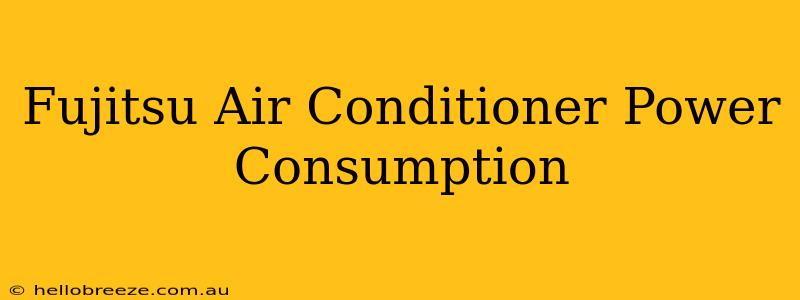Choosing the right air conditioner can be a daunting task, especially when considering energy efficiency. Fujitsu air conditioners are known for their advanced technology and performance, but understanding their power consumption is crucial for both your comfort and your wallet. This guide will delve into the factors influencing Fujitsu AC power consumption and help you make an informed decision.
Understanding Fujitsu Air Conditioner Power Consumption
Several factors determine how much power a Fujitsu air conditioner uses. Let's break them down:
1. Model and Size:
The size of your air conditioner (measured in BTU/h or kW) significantly impacts power consumption. Larger units cool larger spaces more effectively but consume more energy. Similarly, different models within Fujitsu's lineup boast varying energy efficiency ratings. Newer models generally incorporate more energy-saving technology. Always check the specific energy consumption details for the model you are considering.
2. Energy Efficiency Rating (EER/SEER):
The Energy Efficiency Ratio (EER) and Seasonal Energy Efficiency Ratio (SEER) are crucial metrics. A higher EER/SEER rating indicates greater energy efficiency – meaning it cools the same space with less energy. Fujitsu typically offers models with high EER/SEER ratings, contributing to lower running costs.
3. Inverter Technology:
Many Fujitsu air conditioners use inverter technology. Instead of constantly cycling on and off, inverter ACs adjust their compressor speed to maintain the desired temperature, resulting in more consistent cooling and significantly reduced energy consumption compared to non-inverter models. This is a key factor affecting power consumption.
4. Usage Habits:
Your usage habits significantly influence power consumption. Setting the thermostat to a cooler temperature will increase energy usage. Similarly, leaving the AC running continuously when not needed will also increase power consumption. Using smart features like timer functions and eco-modes can help optimize energy consumption.
5. Room Size and Insulation:
The size of the room and the quality of its insulation directly impact the air conditioner's workload. A poorly insulated room will require the AC to work harder, leading to higher energy consumption. Proper insulation minimizes energy waste and enhances the efficiency of your Fujitsu air conditioner.
6. Maintenance:
Regular maintenance, including cleaning air filters, is crucial for optimal performance and energy efficiency. A dirty filter restricts airflow, forcing the unit to work harder and consume more energy.
Tips for Reducing Fujitsu Air Conditioner Power Consumption:
- Choose an appropriately sized unit: An oversized AC will cycle frequently and waste energy. An undersized one will struggle to cool the room effectively.
- Maximize SEER/EER: Opt for Fujitsu models with the highest possible SEER and EER ratings.
- Utilize inverter technology: Inverter technology significantly reduces energy consumption.
- Smart usage: Use timers and eco-modes to optimize energy usage and avoid unnecessary cooling.
- Improve insulation: Seal gaps and cracks in windows and doors to prevent heat loss.
- Regular maintenance: Clean or replace air filters regularly to ensure optimal performance.
Conclusion
Understanding the factors affecting Fujitsu air conditioner power consumption is vital for making an informed decision and managing energy costs. By carefully considering model size, energy efficiency ratings, usage habits, and maintenance, you can minimize energy consumption and enjoy comfortable, cost-effective cooling. Always consult the specific specifications provided by Fujitsu for the model you're interested in to get accurate power consumption data.

